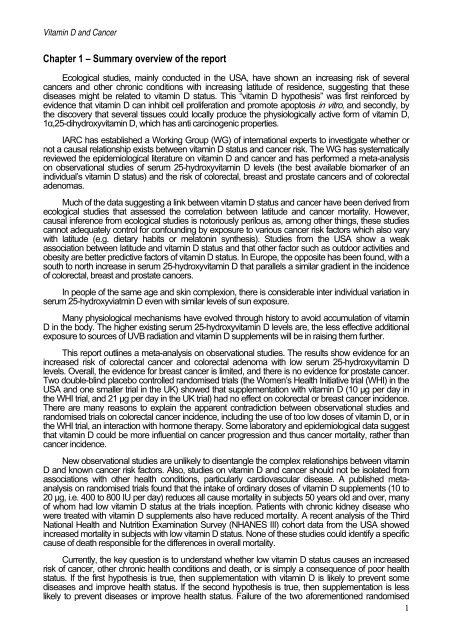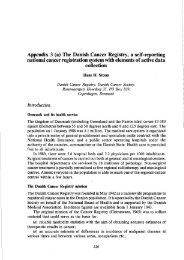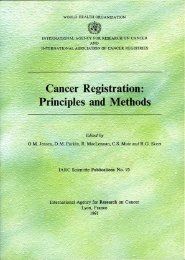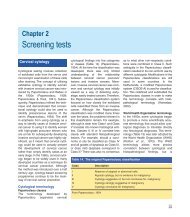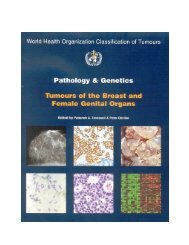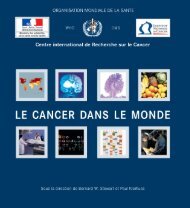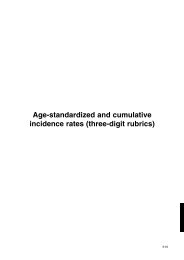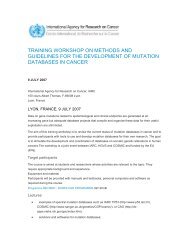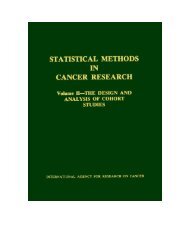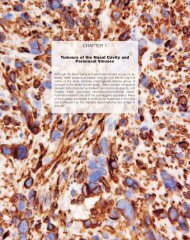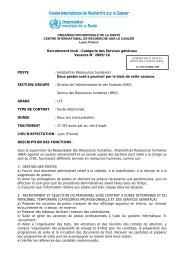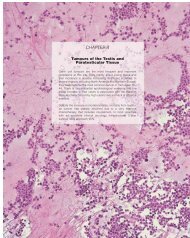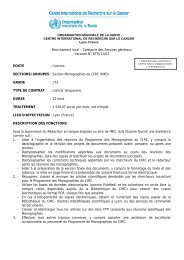Create successful ePaper yourself
Turn your PDF publications into a flip-book with our unique Google optimized e-Paper software.
Vitamin D and Cancer<br />
Chapter 1 – Summary overview of the report<br />
Ecological studies, mainly conducted in the USA, have shown an increasing risk of several<br />
cancers and other chronic conditions with increasing latitude of residence, suggesting that these<br />
diseases might be related to vitamin D status. This “vitamin D hypothesis” was first reinforced by<br />
evidence that vitamin D can inhibit cell proliferation and promote apoptosis in vitro, and secondly, by<br />
the discovery that several tissues could locally produce the physiologically active form of vitamin D,<br />
1α,25-dihydroxyvitamin D, which has anti carcinogenic properties.<br />
<strong>IARC</strong> has established a Working Group (WG) of international experts to investigate whether or<br />
not a causal relationship exists between vitamin D status and cancer risk. The WG has systematically<br />
reviewed the epidemiological literature on vitamin D and cancer and has performed a meta-analysis<br />
on observational studies of serum 25-hydroxyvitamin D levels (the best available biomarker of an<br />
individual’s vitamin D status) and the risk of colorectal, breast and prostate cancers and of colorectal<br />
adenomas.<br />
Much of the data suggesting a link between vitamin D status and cancer have been derived from<br />
ecological studies that assessed the correlation between latitude and cancer mortality. However,<br />
causal inference from ecological studies is notoriously perilous as, among other things, these studies<br />
cannot adequately control for confounding by exposure to various cancer risk factors which also vary<br />
with latitude (e.g. dietary habits or melatonin synthesis). Studies from the USA show a weak<br />
association between latitude and vitamin D status and that other factor such as outdoor activities and<br />
obesity are better predictive factors of vitamin D status. In Europe, the opposite has been found, with a<br />
south to north increase in serum 25-hydroxyvitamin D that parallels a similar gradient in the incidence<br />
of colorectal, breast and prostate cancers.<br />
In people of the same age and skin complexion, there is considerable inter individual variation in<br />
serum 25-hydroxyviatmin D even with similar levels of sun exposure.<br />
Many physiological mechanisms have evolved through history to avoid accumulation of vitamin<br />
D in the body. The higher existing serum 25-hydroxyvitamin D levels are, the less effective additional<br />
exposure to sources of UVB radiation and vitamin D supplements will be in raising them further.<br />
This report outlines a meta-analysis on observational studies. The results show evidence for an<br />
increased risk of colorectal cancer and colorectal adenoma with low serum 25-hydroxyvitamin D<br />
levels. Overall, the evidence for breast cancer is limited, and there is no evidence for prostate cancer.<br />
Two double-blind placebo controlled randomised trials (the Women’s Health Initiative trial (WHI) in the<br />
USA and one smaller trial in the UK) showed that supplementation with vitamin D (10 µg per day in<br />
the WHI trial, and 21 µg per day in the UK trial) had no effect on colorectal or breast cancer incidence.<br />
There are many reasons to explain the apparent contradiction between observational studies and<br />
randomised trials on colorectal cancer incidence, including the use of too low doses of vitamin D, or in<br />
the WHI trial, an interaction with hormone therapy. Some laboratory and epidemiological data suggest<br />
that vitamin D could be more influential on cancer progression and thus cancer mortality, rather than<br />
cancer incidence.<br />
New observational studies are unlikely to disentangle the complex relationships between vitamin<br />
D and known cancer risk factors. Also, studies on vitamin D and cancer should not be isolated from<br />
associations with other health conditions, particularly cardiovascular disease. A published metaanalysis<br />
on randomised trials found that the intake of ordinary doses of vitamin D supplements (10 to<br />
20 µg, i.e. 400 to 800 IU per day) reduces all cause mortality in subjects 50 years old and over, many<br />
of whom had low vitamin D status at the trials inception. Patients with chronic kidney disease who<br />
were treated with vitamin D supplements also have reduced mortality. A recent analysis of the Third<br />
National Health and Nutrition Examination Survey (NHANES III) cohort data from the USA showed<br />
increased mortality in subjects with low vitamin D status. None of these studies could identify a specific<br />
cause of death responsible for the differences in overall mortality.<br />
Currently, the key question is to understand whether low vitamin D status causes an increased<br />
risk of cancer, other chronic health conditions and death, or is simply a consequence of poor health<br />
status. If the first hypothesis is true, then supplementation with vitamin D is likely to prevent some<br />
diseases and improve health status. If the second hypothesis is true, then supplementation is less<br />
likely to prevent diseases or improve health status. Failure of the two aforementioned randomised<br />
1


